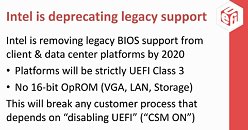Sunday, November 19th 2017

Intel to Remove Legacy BIOS Support from Motherboard UEFI in 2020
Intel is guiding its motherboard partners to remove legacy BIOS support from their UEFI firmware by 2020. The company's client- and enterprise-platforms that come out in 2020 will lack CSM (compatibility support module), a component which lets UEFI-unaware operating systems and bootable devices run on newer machines with UEFI. Devices featuring this CSM-devoid runtime will be graded "UEFI Class 3," as the runtime only exposes UEFI or UEFI PI interfaces.
This practically marks the end of 32-bit operating systems on the newer machines, as 32-bit Windows and desktop Linux distributions require CSM. You'll still be able to use 32-bit software running on 64-bit Windows through WoW64 translation layers. The lack of CSM will also affect devices with 16-bit OpROM, such as older network adapters, and older RAID HBAs. You'll have to depend on OS-based programs to configure those devices. Newer versions of Windows Secure Boot will require UEFI Class 3 devices to function. This also affects booting with your main display plugged into graphics cards older than 4 years (launched roughly before 2013), which lack UEFI-ready video BIOS.
Source:
Tweakers.net
This practically marks the end of 32-bit operating systems on the newer machines, as 32-bit Windows and desktop Linux distributions require CSM. You'll still be able to use 32-bit software running on 64-bit Windows through WoW64 translation layers. The lack of CSM will also affect devices with 16-bit OpROM, such as older network adapters, and older RAID HBAs. You'll have to depend on OS-based programs to configure those devices. Newer versions of Windows Secure Boot will require UEFI Class 3 devices to function. This also affects booting with your main display plugged into graphics cards older than 4 years (launched roughly before 2013), which lack UEFI-ready video BIOS.



38 Comments on Intel to Remove Legacy BIOS Support from Motherboard UEFI in 2020
On the other hand, not a fan of forced secure boot. Until every linux distro and alternative software is capable of using it, I dont want to use locked down hardware.
Take my brother's situation... something happened to his iPhone 7. He was out in the field as part of a military training exercise and a rather heavy rock landed on the phone which resulted in some significant damage to the screen and body of the device. He walked into the Apple Store, explained the problem, and right then and there they replaced the phone for some cost but far better than having to buy a new device outright. He got a new device that same day!!! You can't get that kind of service in the Android world, the best you can hope for is waiting 48 to 72 hours for Assurion to receive the device, process the claim, and ship you a refurbished device that you hope will work correctly since there's more than a number of horror stories where people have received dead devices from Assurion which of course starts the whole process over again. Not so with Apple, you just walk in with a problem and you walk out happy. This is how it should be, companies can learn from Apple when it comes to Customer Service!!!You can't say that because you don't know what people may do as their day jobs. For instance, people who are doctors, lawyers, and other various jobs that take up a good majority of their day don't want to have to deal with the complexities of computers so they just want it to work and there's no problem with that kind of thinking.
Yes it's progression, old antic bios but that progression comes with a cost of somehow vendor lock-in, which is'nt a good thing.
When W7 becomes EOL i'm switching over to Linux. More privacy and still able to use Windows related programs by the use of Wine. I dont want a OS pushing updates or drivers which might be the culprit of a system BSOD'ing out of the blue while work is left open.
EFI is the Extensible Firmware Interface, intended to simplify driver development across CPU architectures and operating systems. Now, more than 10 years in, consumer products still doesn't use this feature.
EFI runs a "sub kernel" controlling all the devices of the system without the OSs knowledge, and it has network access. Not only does it use CPU resources, but also presents a huge security risks. Motherboard vendors rarely update their BIOSes after two years, and since this can't be circumvented by software, end users might be forced to upgrade fully usable hardware. EFI is the most critical piece of software in a modern system, yet its code quality is awful.
The last big issue of EFI is the "Secure" Boot, which is nothing but a headache for other operating systems.We still have a long way to go for EFI to be painless. As recent as June I had to revert a bunch of new Dell systems (Skylake) to legacy mode to get hardware properly initialized.
That is in contrast to Android. Google makes the OS but a lot of manufacturers make devices running it (including Google themselves). So there's a lot more models coming out and a lot more competition going on. The manufacturers also don't have storefronts. It'd be absurd; imagine if video card or motherboard manufacturers did that. Not Intel, AMD, or Nvidia. But ASUS, AsRock, Colorful, EVGA, Gigabyte, Palit, Zotac, etc. each having physical stores in a city. Android has a much larger market share than iOS, but that large market share is divided among all the Android device manufacturers. So having to do a glorified RMA/warranty claim instead of walking up to a store and processing it immediately is understandable. Though in parts of the world where phones are subsidised, you can deal with replacements via the retail stores of your phone service carrier.
The closest equivalent to Apple's service in the PC space I can think of is pre-built PC companies like Dell. And Dell's corporate support is what retains clients. Business customers needed their machines working yesterday and will pay for that support so they can... get back to business. But Dell doesn't need a physical presence since they're dealing with a level above the general public which is a much smaller and compact group.
By the way, while you would never buy a Mac, how do you feel about the control on iOS compared to Android? After the jailbreaks and roots, how do they compare?That probably came out more harsh than I intended but I've pretty much seen the full gamut of attitudes regarding basic computer/mobile security. Some will pick it up slowly but patiently and diligently. Some do have busy jobs and/or are single parents with a bunch of young kids and ailing parents so can't spend much time on it. But others really don't have the attention span nor the cognitive ability to delve into it. Thankfully, stuff like the combination of uBlock Origin and NoScript provide good returns even with minimal investiture.
My biggest problem with Android and the chief reason why I went to the iPhone is the appearance that the Android OEMs don't care about you past the point of you handing over your hard earned cash. Software updates have to go through your carrier and some carriers are worse than others, this of course makes it so that you may end up with a device that's a maybe a couple of months old that you spent a good amount of money on and yet you're not getting critical software updates. It would be like Microsoft telling you "Oh, your computer is six months old. No updates for you!" And why do the Android OEMs do this? They want you to buy the next new device. Why? Simply put, it all comes down to money; lots of money. The OEMs just love to rake it all in and of course the majority of the public falls for this strategy hook, line, and sinker. Meanwhile you have Apple where you're pretty much guaranteed to have software updates for at least five years which is very much like how Microsoft is treating Windows 7 which was released eight years ago.